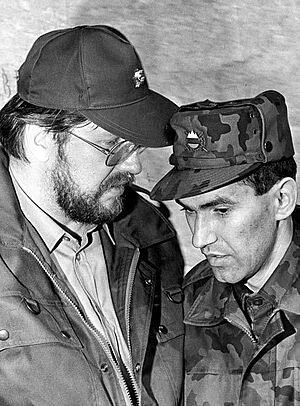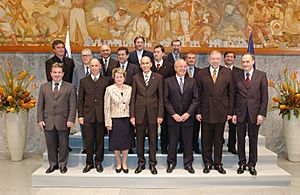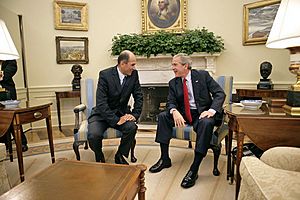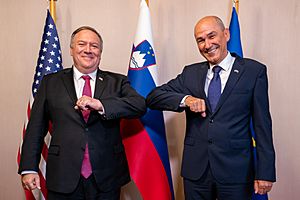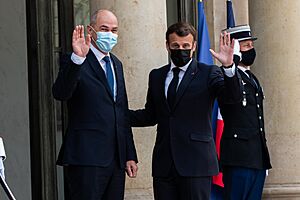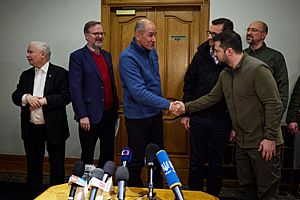Janez Janša facts for kids
Quick facts for kids
Janez Janša
|
|||||||||||||
|---|---|---|---|---|---|---|---|---|---|---|---|---|---|
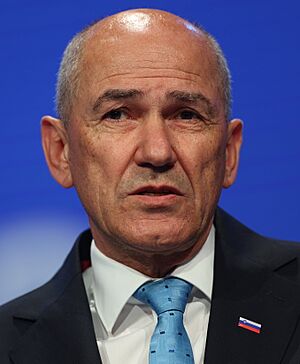
Janša in 2025
|
|||||||||||||
| Prime Minister of Slovenia | |||||||||||||
| In office 3 March 2020 – 1 June 2022 |
|||||||||||||
| President | Borut Pahor | ||||||||||||
| Preceded by | Marjan Šarec | ||||||||||||
| Succeeded by | Robert Golob | ||||||||||||
| In office 10 February 2012 – 20 March 2013 |
|||||||||||||
| President | Danilo Türk Borut Pahor |
||||||||||||
| Preceded by | Borut Pahor | ||||||||||||
| Succeeded by | Alenka Bratušek | ||||||||||||
| In office 3 December 2004 – 21 November 2008 |
|||||||||||||
| President | Janez Drnovšek Danilo Türk |
||||||||||||
| Preceded by | Anton Rop | ||||||||||||
| Succeeded by | Borut Pahor | ||||||||||||
| Minister of Defence | |||||||||||||
| In office 7 June 2000 – 30 November 2000 |
|||||||||||||
| Prime Minister | Andrej Bajuk | ||||||||||||
| Preceded by | Franci Demšar | ||||||||||||
| Succeeded by | Anton Grizold | ||||||||||||
| In office 16 May 1990 – 29 March 1994 |
|||||||||||||
| Prime Minister | Lojze Peterle Janez Drnovšek |
||||||||||||
| Preceded by | Office established | ||||||||||||
| Succeeded by | Jelko Kacin | ||||||||||||
| Leader of the Slovenian Democratic Party | |||||||||||||
| Assumed office May 1993 |
|||||||||||||
| Preceded by | Jože Pučnik | ||||||||||||
| Member of the National Assembly for Grosuplje |
|||||||||||||
| Assumed office 8 April 1990 |
|||||||||||||
|
|||||||||||||
| Personal details | |||||||||||||
| Born |
Ivan Janša
17 September 1958 Grosuplje, PR Slovenia, FPR Yugoslavia |
||||||||||||
| Political party | Slovenian Democratic (since 1992) |
||||||||||||
| Other political affiliations |
League of Communists (1975–1983) Slovenian Democratic Union (1989–1991) |
||||||||||||
| Spouse |
Urška Bačovnik
(m. 2009) |
||||||||||||
| Domestic partner | Silva Predalič | ||||||||||||
| Children | 4 | ||||||||||||
| Education | University of Ljubljana | ||||||||||||
Janez Janša (born 17 September 1958) is a Slovenian politician. He served three times as the Prime Minister of Slovenia, from 2004 to 2008, from 2012 to 2013, and from 2020 to 2022. Since 1993, Janša has been the leader of the Slovenian Democratic Party, a major conservative political party in Slovenia.
Janša was also the Minister of Defence from 1990 to 1994. He held this role during the Ten-Day War, which was Slovenia's war for independence. After his second term as prime minister ended in 2013, he faced legal issues. He was later selected as prime minister again in March 2020. His third term as prime minister ended in May 2022.
Contents
Early Life and Education
Janez Janša was born into a Roman Catholic working-class family in Grosuplje, Slovenia. He was called Janez (a version of the name Ivan) since he was a child.
In 1982, Janša graduated from the University of Ljubljana with a degree in Defence Studies. He then started working at the Defence Secretariate of Slovenia.
When he was 17, in 1975, Janša joined the League of Communists. He became a leader in its youth group. In 1983, he was removed from the party because he criticized the military system.
Becoming a Dissident
In the 1980s, as Slovenia began to allow more democratic freedoms, Janša wrote articles that criticized the Yugoslav People's Army. Because of this, his passport was taken away in 1985. He was also not allowed to work in state-owned companies or publish articles. During this time, he wrote computer programs and worked as a mountain guide.
Later, he was able to publish articles again in Mladina magazine. These articles shared his opinions on democracy and national independence. He also became involved in movements for peace and the environment.
Arrest and Trial
On 31 May 1988, Janša was arrested. He was accused of having a secret military document. He and two journalists were tried by a military court. The trial was held in secret, without lawyers, and in Serbo-Croatian instead of Slovene.
Janša was sentenced to 18 months in prison. This case, known as the JBTZ affair, caused many protests against the government. It helped speed up the process of Slovenia becoming more democratic. A group called the Committee for the Defence of the Rights of Janez Janša was formed to support him. It quickly grew to over 100,000 members.
Janša was released after about six months. After his release, he became the editor-in-chief of the political magazine Demokracija (Democracy).
Political Career Begins
1990–1994: Minister of Defence
In 1989, Janša helped create one of Slovenia's first opposition parties, the Slovenian Democratic Union. After the first free elections in May 1990, he became the Minister of Defence. He held this position during the Slovenian War of Independence in 1991. Janša, along with the Minister of Interior, helped plan Slovenia's defense against the Yugoslav People's Army.
In 1992, Janša joined the Social Democratic Party of Slovenia, which is now called the Slovenian Democratic Party. In May 1993, he became the president of this party and has led it ever since.
In 1994, Prime Minister Janez Drnovšek removed Janša from his role as Defence Minister. This happened after an incident involving military personnel and a civilian police associate.
1994–2004: In Opposition
In the 1996 parliamentary elections, Janša's party gained many more votes. It became the third-largest political party. For most of the time until 2004, his party was in opposition, meaning they were not part of the ruling government.
During this period, Janša supported Slovenia joining the European Union (EU) and NATO.
First Term as Prime Minister (2004–2008)
Janša served as Prime Minister of Slovenia for the first time from November 2004 to November 2008. During this time, Slovenia was very excited after joining the EU.
In 2007, after Danilo Türk won the presidential election, Janša asked for a vote of confidence in his government. He said that criticism from other parties was making it hard for the government to work, especially since Slovenia was leading the European Union at the time. His government won the vote.
Allegations and Criticism
In 2008, a Finnish TV documentary made claims that Janša had received money from a Finnish defense company. Janša denied these claims. Media freedom groups criticized Janša for naming journalists and trying to influence the Finnish government regarding the TV story.
Return to Opposition (2008–2011)

In the November 2008 parliamentary election, Janša's party came in second place. Borut Pahor became the new prime minister.
In December 2011, Janša's party again came in second in the parliamentary elections. Since the leader of the first-placed party could not form a government, Janša was proposed as prime minister by a group of parties. He officially became prime minister again on 10 February 2012.
Second Term as Prime Minister (2012–2013)
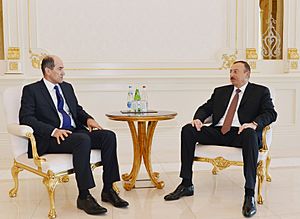
Janša's second term as prime minister lasted only one year. During this time, Slovenia faced economic challenges due to the global economic crisis.
In January 2013, a report from the Commission for the Prevention of Corruption stated that Janša had not properly reported his assets. It also showed that some of his funds came from an unknown source. After this report, several parties left Janša's government. On 27 February 2013, Janša's government lost a vote of no confidence and fell.
After Prime Minister (2013–2018)
After his government fell, Janša decided not to return to his position as a member of the National Assembly. He chose to work for his party, write books, and give lectures.
In June 2013, a court in Ljubljana ruled that Janša and two others had sought money from a Finnish company. Janša was sentenced to two years in prison. He denied the accusations, saying the case was politically motivated.
Imprisonment and Release
On 20 June 2014, Janša began serving his prison term. He was escorted to Dob Prison by about 3,000 supporters. Many legal experts pointed out issues with the court case. On 12 December 2014, Janša was temporarily released. The conviction was later overturned by the Constitutional Court on 23 April 2015.
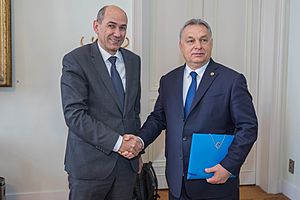
Third Term as Prime Minister (2020–2022)
After the previous prime minister resigned, Janša was elected as prime minister-designate on 3 March 2020. He was sworn in on 13 March 2020.
On 4 November 2020, the day after the 2020 United States presidential election, Janša congratulated Donald Trump on his supposed reelection. He was the only world leader to do so when news organizations later announced Joe Biden as the winner.
Janša described the Fall of Kabul to the Taliban in August 2021 as "the greatest defeat for NATO in history."
After the start of the 2022 Russian invasion of Ukraine, Janša traveled to Kyiv on 15 March 2022. He went with the prime ministers of Poland and the Czech Republic to meet with Ukrainian president Volodymyr Zelenskyy. This visit showed support for Ukraine's independence.
Janša's third term as prime minister ended on 13 May 2022. He was officially succeeded by Robert Golob on 1 June 2022.
Balkan Non-Papers
In April 2021, two documents, called the Balkan non-papers, were discussed. These documents suggested changes to borders in the Balkan region. It was said that Janša might have created or shared these papers. The ideas in the documents were strongly criticized by many political leaders in the region and from the European Union.
Janša spoke with a Bosnian leader and stated that "there is no non-paper regarding border changes in the Western Balkans." He also added that he supports the current borders of Bosnia and Herzegovina.
Personal Life
Janša enjoys being active. He is a mountaineer, golfer, footballer, skier, and snowboarder.
Janša has four children. He was in a long-term relationship with Silva Predalič, and they had two children. Since July 2009, Janša has been married to Urška Bačovnik. They have two sons, Črtomir (born in 2011) and Jakob (born in 2013).
Author
Janša has written several books. Two of his notable books are Premiki ("Manoeuvres", published in 1992) and Okopi ("Barricades", 1994). In these books, he shares his thoughts on Slovenia's journey from communism to a parliamentary democracy. He also published a second edition of Okopi in 2014, called Dvajset let pozneje Okopi ("Twenty Years Later, Trenches II").
Other books he has been involved with include:
- Podružbljanje varnosti in obrambe ('The Socialization of Security and Defence', editor); 1984.
- Stane Kavčič, Dnevnik in spomini ('The Memoirs of Stane Kavčič', co-edited with Igor Bavčar); 1988.
- Na svoji strani ('On One's Own Side', collection of articles); 1988.
- Premiki: nastajanje in obramba slovenske države 1988–1992; 1992. English translation: The Making of the Slovenian State, 1988–1992: the Collapse of Yugoslavia; 1994.
- Sedem let pozneje ('Seven Years Later'). 1994.
- Osem let pozneje ('Eight Years Later', co-authored with Ivan Borštner and David Tasić); 1995.
- White Panther: the first book of The kingdom of Noric. 2018.
See also
 In Spanish: Janez Janša para niños
In Spanish: Janez Janša para niños
 | Delilah Pierce |
 | Gordon Parks |
 | Augusta Savage |
 | Charles Ethan Porter |


